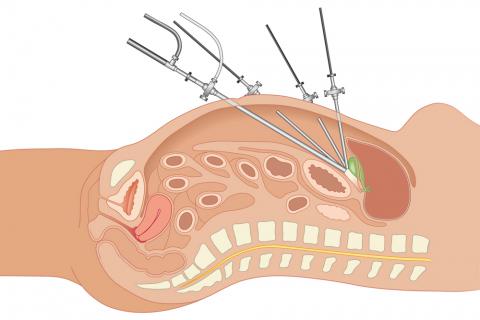Oncologic and minimally invasive laparoscopic surgery

- Less pain
- Lower risk
- Minor bleeding
- Much smaller scars with better cosmetic results
- Less need for analgesics
- Less hospitalization time
- A faster return to daily life.
Laparoscopic surgery can be performed in multiple pathologies in urology. The most frequent are:
PROSTATE CANCER:
It is the most common cancer in adult men.
Prostate cancer is suspected by digital rectal examination and prostate antigen. Then, a prostate MRI may be performed and if a suspicious lesion is confirmed, a prostate biopsy is performed. Once the diagnosis is confirmed, your urologist will evaluate multiple factors (prostate antigen level, digital rectal exam characteristics, pathology report, etc.) to make a decision on the best treatment option in your case.
There are several treatment modalities among which are:
- Active observation
- Focal therapy
- Radiotherapy
- Surgery (Radical Prostatectomy).
If you are a candidate for surgery, it can be performed laparoscopically with the aforementioned benefits. It is important to know that surgery, regardless of whether it is open, laparoscopic or robotic, has a risk of producing urinary incontinence (5%) and erectile dysfunction (50-70%).
KIDNEY CANCER
Kidney cancer is the most lethal tumor in urology. Most of the time it is diagnosed incidentally (since it does not produce symptoms until it is advanced) in imaging studies such as ultrasound, CT or MRI. On some occasions, it may manifest with hematuria (blood in the urine).
Once the tumor is evident in the imaging studies, surgery is performed directly. Kidney tumors are not biopsied before surgery. It is a purely surgical tumor, where it can be completely cured by surgery alone, without the need for chemotherapy, immunotherapy or radiotherapy.
The indicated surgery consists of the partial or total removal of the affected kidney. The decision depends on the size and location of the tumor. Both surgeries can be performed laparoscopically with the aforementioned benefits.
OTHER COMMON LAPAROSCOPIC SURGERIES:
KIDNEY EXTRACTION (Nephrectomy)
When a kidney stops functioning completely, in most cases it is best to remove it. This can happen for multiple causes, the most frequent being an obstructive urinary calculus that was not operated on in time. In turn, this surgery can be performed laparoscopically with the aforementioned benefits.
PIELOPLASTY
In some cases, the site where the kidney pelvis joins the ureter is narrowed, causing the kidney to dilate and progressively decrease its function. This may require surgery called pyeloplasty, in which the narrowed segment is cut and removed and a new attachment of the renal pelvis to the ureter is made. Similarly, this surgery can be performed laparoscopically with the aforementioned benefits.
SURGERY FOR LARGE STONES
This is not a laparoscopic surgery but a minimally invasive surgery.
When urinary calculi are large in size, endoscopic laser surgery cannot be performed and Percutaneous Nephrolithotomy is necessary. This surgery consists of making an incision of less than 1 cm in the patient’s back, through which special equipment is introduced into the kidney. The stone is then fragmented into smaller pieces so that they can be removed.
Dr. Wadskier is one of the few urologists who performs this type of surgery in Colombia, having extensive experience with more than 500 surgeries performed of this type, which led him to be appointed Director of the Section of Endourology and Lithiasis of the Colombian Society of Urology in the period from 2019 to 2021.
DO YOU HAVE ANY QUESTION?
Enter your data and we will contact you soon.

